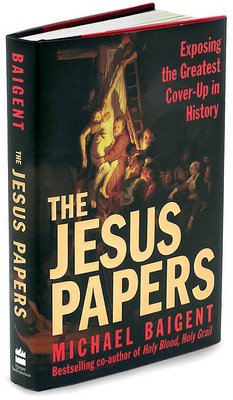Jesus denied he was 'son of God'
The Jesus papers in the book’s title are two scrolls supposedly written in Aramaic and found under a house in the old city of Jerusalem in the 1960s. It is claimed they are letters written to the Jewish court, the Sanhedrin, by Jesus, saying he is not the son of God but is filled with the spirit of God.
Baigent also claims he has discovered information about a mysterious document that purports to provide evidence that Jesus was alive in AD45, more than a decade after the accepted date for the crucifixion. The document was supposedly seen by Alfred Lilley, canon at Hereford Cathedral, at a church in Paris in the 1890s but later vanished. Baigent believes it now rests in the Vatican.

Jesus was a real man with siblings. On his father's side Jesus was descended from the line of David, King of Israel. On his mother's side he was descended from Aaron, the high priest. He was, therefore, a doubly legitimate messiah from the temporal and spiritual lines. His "death" on the cross was manufactured by his followers. He "died" when he was given a solution of drugs in the sponge. Taken down from the cross, he was quickly removed to a tomb owned by one of his supporters and conveniently located nearby, where he was revived. Even the Koran (IV, 155ff) speaks of a rigged crucifixion, according to Baigent. He married Mary Magdalene and lived happily thereafter in the South of France.
A group called the Zealots is the key. They wrote the Dead Sea Scrolls, and were Judean freedom fighters in Baigent's view. Jesus grew up among them, and at least two of his disciples were Zealots, Simon Zelotes and Judas Iscariot. It is this political aspect that is excluded from the New Testament, "a sanitized, censored, and often inverted view of the time." It was a view which steadily removed Jesus from his Jewish context and ultimately led theologians and artists to depict him as a blond, blue-eyed European.
Baigent notes that documents continue to be discovered and sold. The recent "Judas Gospel" is a prime example and would seem to lend a slight air of credence to Baigent's proposition. Ultimately, Baigent writes, "All history is a myth, a story created to make some sense out of the few events we can know. The past is a hypothesis erected to explain and justify the present." History is what gets documented by the victors and does not always represent what really happened so we must read and interpret many different accounts of a particular event in order to arrive near the "Truth."







0 Comments:
Post a Comment
<< Home